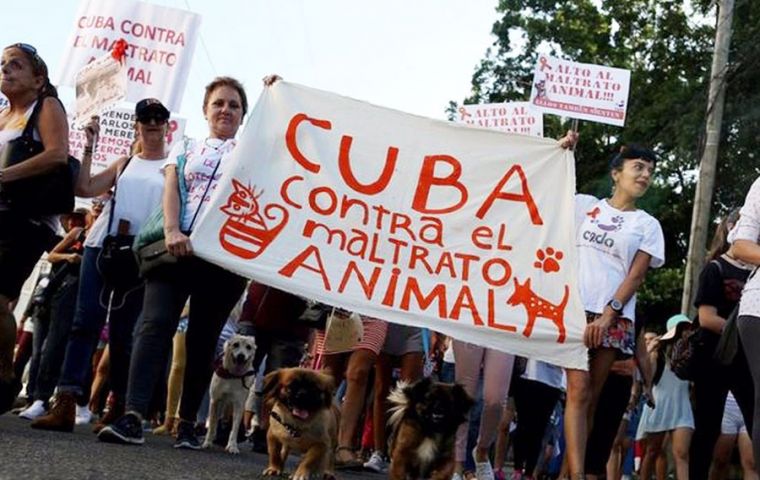MercoPress. South Atlantic News Agency
First independent group march authorized in Cuba
 Accompanied by their pets, the activists carried placards calling for an animal protection law and chanted “down with animal abuse”
Accompanied by their pets, the activists carried placards calling for an animal protection law and chanted “down with animal abuse” Hundreds of Cubans marched peacefully through Havana calling for an end to animal cruelty on Sunday in what organizers believe was the first independent march authorized by the one-party state.
Accompanied by their pets, the activists carried placards calling for an animal protection law and chanted “down with animal abuse” as they walked through the central district of Vedado to the surprise of curious onlookers.
That the Communist government authorized ordinary citizens to stage the march could point to an expanding tolerance for Cubans to express their views and even make demands, albeit still within limits, analysts and participants said.
Authorities still crack down on opposition attempts to hold demonstrations and detain dissidents who they say are subversives in the pay of the United States, however.
It was ironic that the first authorized independent march would be in support of animal and not human rights, but it could be a pilot test for greater freedoms, some march participants said.
Previous marches have been largely restricted to those organized by the government to celebrate Cuba's 1959 leftist revolution or criticize its Cold War foe, the United States, religious processions, and an annual march by gay rights activists under the umbrella of a government organization.
While physical public spaces in Cuba remain tightly controlled, a recent expansion of internet access in what was long one of the western hemisphere's least connected countries has allowed citizens to mobilize more in the virtual realm.
Sunday's event was publicized on social media and independent online media.
The government appears to have become more tolerant of and even responsive to online activity since Miguel Diaz-Canel last April replaced Raul Castro as president last April.
In December, the government postponed the full implementation of a decree clamping down on the arts after an online campaign protesting the law, and rowed back on regulations governing the private sector after entrepreneurs and experts complained.




Top Comments
Disclaimer & comment rulesCommenting for this story is now closed.
If you have a Facebook account, become a fan and comment on our Facebook Page!